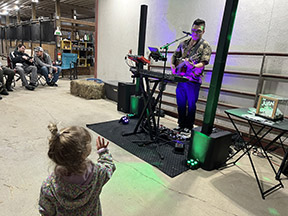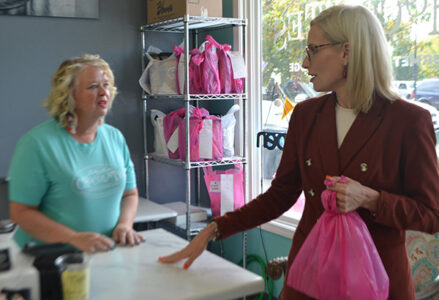Home visiting programs aim to ‘build healthy families’

CONTRIBUTED PHOTO - CAPS Family Support Specialist Fatima Garcia, left, provides a home visit to the family of Alma Lopez and her 22-month-old son Aibar Pizzaro Lopez. Here, Garcia reviews results from a developmental screening that was completed for Aibar.
Sometimes parents need extra support, be it for reasons of poverty, being new to the United States, teen pregnancy, a history of trauma, abuse, neglect and more. The inaugural National Home Visiting Week of April 21-25 celebrates and recognizes home visitors and the positive impact made on maternal and child health outcomes. The week has received bipartisan support as U.S. Senators Chuck Grassley (R-Iowa) and Mark Warner (D-Virginia) issued a proclamation to highlight the importance of home visiting.
“Every child deserves the chance to live up to his or her potential, and the first few years of a child’s life are crucial to their overall growth and development. I’ve long championed efforts to support parents and children and hope to see my bipartisan resolution to honor national home visiting week pass the Senate soon. We must support parents as they raise the next generation,” U.S. Sen. Chuck Grassley said in a statement.
CAPS (Child, Adolescent, and Parent Support) uses its two home visiting programs — Building Healthy Families and Maternal, Infant, and Early Childhood Home Visiting (MIECHV) — to teach parenting skills, offer advice, monitor child development and provide positive role models. Services are free and voluntary, and available to anyone in the county that has children prenatal to age 5. The programs work the same, but receive different funding sources. Adding MIECHV allows CAPS to serve 40 more families than it could alone with Building Healthy Families, which in the past had a wait list.
CAPS is accredited by the Parents as Teachers organization and holds a blue ribbon status.
Nine CAPS employees conduct home visits in Marshall County (or you can meet at the office) a minimum of twice a month for about an hour. They are mandatory reporters. Between the two programs, approximately 200 families are served per fiscal year. Most of the nine staff are bilingual (English and Spanish) and have access to a translation line for other languages.
“Our primary goal with home visiting is to provide education, support and developmental monitoring,” said Esi Monroy, CAPS associate director, and past home visitor. “Home visiting is such a precious and intimate thing. Home visitors really are the first line of defense…We have such valuable information that oftentimes other partners don’t get to see because they’re not going into the home. So even just for that reason alone, I think it’s so important to have home visiting in our county, because we are able to catch so many things, and I’m proud to say that we do. We often are the first ones to bring up a concern to the doctor, we often are the first ones to share with the school that family is struggling to put food on the table.”
Parents learn skills including safe sleeping for infants, monitoring developmental milestones such as crawling, walking and talking, nutrition, discipline and more, via the Parents as Teachers curriculum. Home visitors provide healthy pregnancy information and work to ensure families have access to medical and dental care and register children for school.
“All of our home visitors are from Marshalltown. They live here and work here, and are part of the community, and we really make it a point to learn about other cultures that we serve and to get to know all families and really meet them where they’re at — literally,” Monroy said.
Staff members meet clients at laundry facilities, ride with them on public transit to ensure they get to doctor’s appointments, and go into the schools to chat with pregnant teens in the program. Families range from two parent homes, to single parent, multigenerational, grandparents raising children, and other situations.
“We’re not in the business of enabling families. We want to give families the tools and confidence and strategies they need to be successful after we’re gone. If we do our job right, education skills that we’ve taught them will stay long after we’re gone and that’s our goal.”
CAPS welcomes referrals, receiving them from medical partners, WIC offices, MPACT and school nurses. After a family ages out of the program, CAPS remains a resource, if needed.
“The beauty of it is that we do have some discretion, so there are many times when a family is not ready to age out. We can leverage the date, and we need to keep them for an additional six months or something, and we can absolutely do that. We do make sure to connect to services they need so that they can continue to be successful. We won’t just abruptly end services for them,” she noted.
Monroy said the success of home visiting can be seen in higher school graduation rates, people leaving violent relationships, and working to end generational abuse.
“A lot of what we do is try to provide information. There’s a different way to do things. A different way to discipline. Now more than ever, a great majority of our parents are what we would consider higher risk families, meaning that they have multiple risk factors. Maybe they are low income, low education, substance use, mental health, etc,” she said. “It’s also understanding that we have a lot of parents that are doing the best they can, but they themselves come from a background of trauma or abuse. I’ve never met a parent that has told me I want to be a bad parent. Ever. I have met families that have been through very traumatic and difficult things…We’re going to give you skills and build your knowledge and confidence so you can be a different parent than maybe the parent you had.”
Emma Michels, who serves as director of community engagement at CAPS, noted that April is Child Abuse Prevention Month.
“We are partnering with Community Partnerships for Protection Children (CPPC) and other agencies to end Child Abuse Prevention Month with a Family Fun Color Run on May 3 at the Y,” she said.
The run will start at 9:30 a.m. and be a ½ mile distance along the bike trail by the Y. No registration necessary. It will take place during the Y’s Healthy Kids Day, which will run from 9 a.m. to 11 a.m. and include games, snacks and inflatables.
To learn more about CAPS, and its home visiting programs, Monroy may be reached at: esmeralda@capsonline.us.





